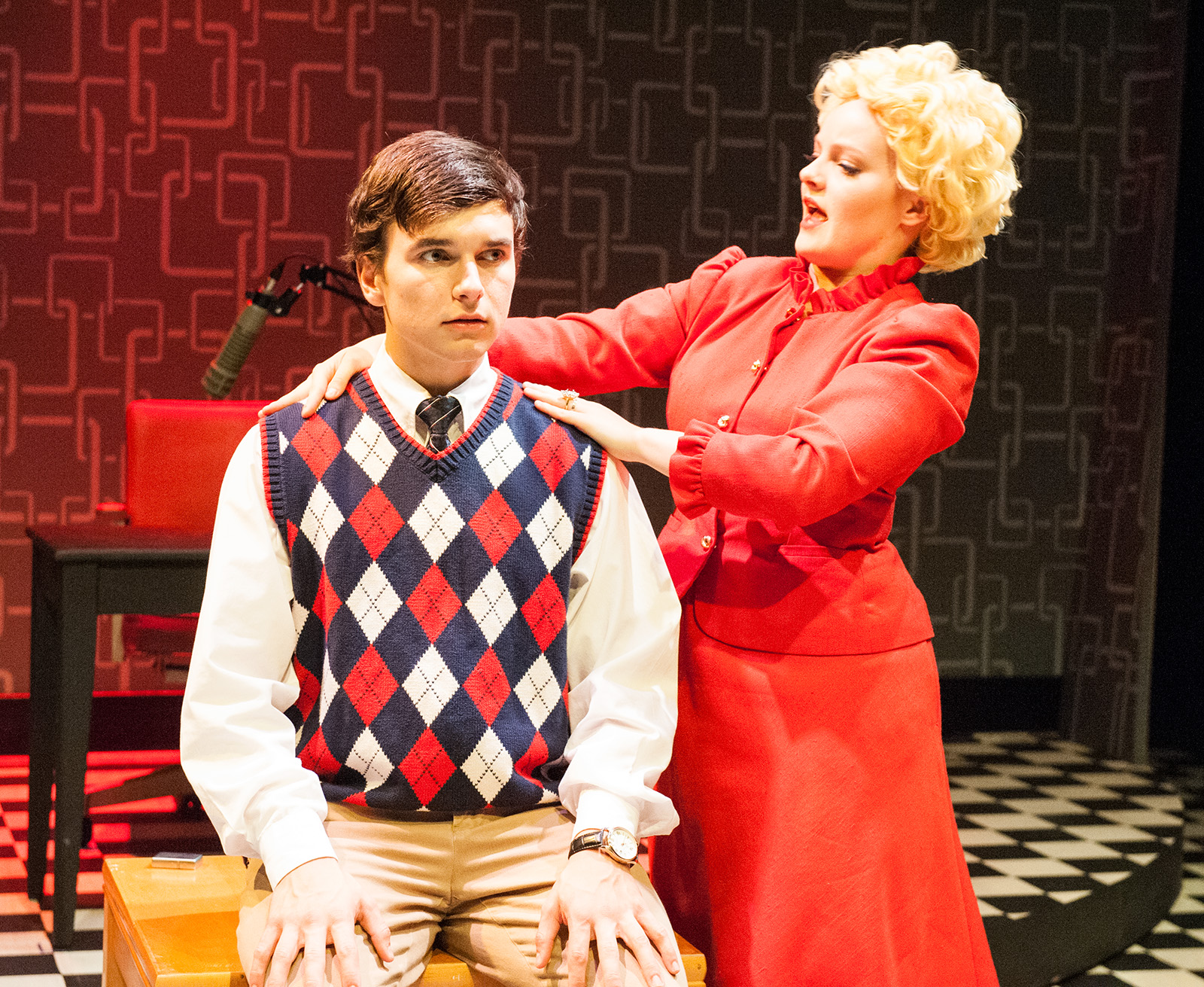Satirical play portrays two polar opposite political views to urge tolerance

Sam Linkowski (left), a third-year theater student, and Molly Livingston (right), a fourth-year theater student, play Ben and Myrna, respectively, in “The Mineola Twins,” where Ben is Myrna’s son. (Anirudh Keni/Daily Bruin)
"The Mineola Twins"
Dec. 4 - Dec. 8
1340 Macgowan Hall
Prices vary
By Olivia Bridgnell
Dec. 3, 2018 1:04 a.m.
The black-and-white checkerboard stage floor in “The Mineola Twins” represents its lead characters’ inability to see the world in shades of gray, said Molly Livingston.
Livingston, a fourth-year theater student and one of the lead actresses, said the play focuses on the dangers of absolute opinions and seeing the world in black and white. The UCLA School of Theater, Film and Television’s production will run Tuesday through Saturday at the Black Box Theater in Macgowan Hall. The satirical play, written by Pulitzer Prize-winner and UCLA’s playwright-in-residence Paula Vogel, follows twin sisters from Mineola, New York, with opposite political views throughout the Eisenhower, Nixon and Reagan administrations.
Adjunct associate professor and director of the play Judith Moreland said the play explores serious socio-political issues through satire, which Livingston said is expressed in the form of the characters’ extreme viewpoints. Moreland said she hopes it will help audiences find common ground rather than perpetuating division, and emphasizes the importance of sisterhood among women.
“Women, we need to work together. … It is the infighting that is holding us back a little bit,” Moreland said. “We need to find a way to talk to each other, otherwise we are going to destroy ourselves, and that is exactly what the play is about.”
Romy Bavli, a third-year theater student who plays Myra, one of the twins, said although the twins are labeled as “good” and “bad,” their evolution throughout the play allows the audience to sympathize with the characters. As the characters develop, she said she hopes the audience will realize people are more complex than they seem. Livingston, who plays Myrna, the other twin, said the characters become more obstinate in their beliefs as they age. The sisters’ extreme political views are satirized through intense, exaggerated dialogue, she said, and this humor allows the taboos around controversial topics to fade momentarily.
“It’s a cautionary tale about what you lose in life when you decide that you’re clinging to your one perspective,” Livingston said. “If we lead with love … and empathize, then how can you go wrong?”
Specifically, the twins are obstinate in their perspectives on women’s rights, Moreland said. Teenage Myrna does not believe a woman has agency, and wants to become a housewife, she said. Meanwhile Myra does not look to conform to society’s expectations and lives by her own rules. Bavli said her character dislikes conservative President Nixon while Myrna loves conservative women like Barbara Bush, who was perceived to have traditional values. She said the audience can see the extreme differences in the sisters’ views as Myra fights fervently for women’s rights and works at Planned Parenthood, while Myrna protests this fight for change.
The production’s satire stems from the extreme ideologies of both twins, Bavli said, since anything exaggerated tends to become comedic. Myra is a liberalist to the absolute extreme, and Myrna is a staunch conservative, she said, and their difference in opinion gives rise to absurd dialogue between them. In one scene, Myra vocalizes her support of abortion; in a pro-choice world, she says her son and his girlfriend wouldn’t have to choose between coat hangers or marriage if he gets her pregnant.
Bavli said the twins have an inner desire to connect despite their claimed hatred for each other. She said their relationship satirizes the United States’ political division through mirrored sentences. The twins say the same phrases in opposite contexts, revealing their contrasting, yet connected beliefs, she said. For example, she said they both say “we will never give this country back” in different circumstances.
“It’s just one of those plays that is, about 20 years later, so relevant still,” said Bavli. “I think people will always have this fear of the other and fear of people who think differently, or act differently, or live differently than them.”
Moreland said the play is a more accurate portrayal of women than the majority of industry productions. “The Mineola Twins” tells the story from the perspective of women and was penned by a female playwright, which can be uncommon since plays are often about men and written by men. She said women should stop fighting and embrace all ideologies so they can focus on advancing their rights. “The Mineola Twins” strives to satirize progressivism and conservatism alike in order to bring audiences together despite their political differences, she said.
“Our strength lies in our diversity and we need to embrace that rather than chastising it,” said Moreland. “We need to stop calling each other names and start working together.”


